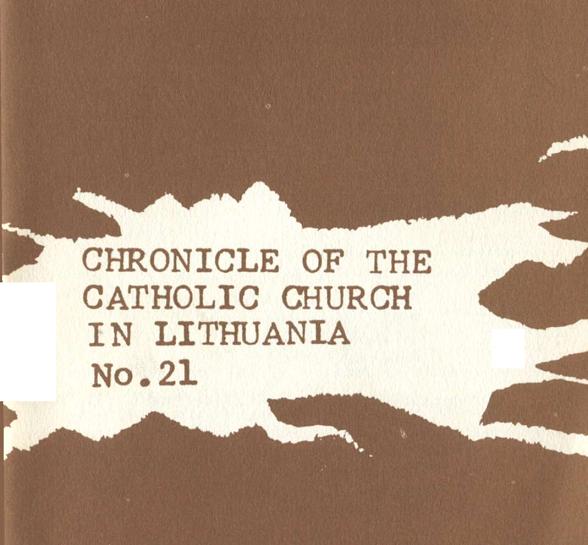CHRONICLE OF THE CATHOLIC CHURCH IN LITHUANIA No. 21 
In this issue:
Continuing Persecution of Youth
Lithuania January 25, 1976

A Translation of Authentic Reports from Soviet-Occupied Lithuania
Published by the Lithuanian Roman Catholic Priests' League of America 351 Highland Boulevard Brooklyn. NY 11207
© Copyright 1978 by the Lithuanian Roman Catholic Priests' Leag of America
Printed by
Franciscan Fathers Press 341 Highland Blvd. Brooklyn, NY 11207
CHRONICLE OF THE CATHOLIC CHURCH IN LITHUANIA No. 21
Introduction
Perhaps one of the most remarkable aspects of the dissident movement in the U.S.S.R. today is the way in which it has united Orthodox Christian, Jew, Catholic, and agnostic in the common cause of human rights.
The Chronicle of the Catholic Church in Lithuania No. 21 opens with a report of the trial of Sergei Kovalev, in Vilnius, Lithuania, December 9 - 12, 1975. Kovalev, a well-known Russian biologist, was tried partly because of his aid to Lithuanian nationalists and Catholics. Friends and acquaintances from far away as Moscow, including Yuri Orlov and Andrei Sacharov, came to attend the trial, but were banned from the court-room along with western correspondents, in spite of the fact that the trial was billed as "public".
Kovalev was found guilty on all counts and sentenced to seven years of strict regime labor camp and three additional years of internal exile.
Following the report of the Kovalev trial is yet one more petition asking the Soviet government to allow Bishop Julijonas Steponavičius, of Vilnius, to return to his duties, from which he has been kept since 1958 It is signed by no less than 68 Catholic priests of Lithuania.
Next comes an autobiographical sketch by the former political prisoner Antanas Terleckas, addressed to I. V. Andropov, head of the KGB, with an appeal to be relieved of the constant pressure placed upon him by the Soviet security organs.
Reports from various cities and towns document the continuing persecution of religious believers at the hands of the atheists, with the tacit approval of the Soviet government. A computer specialist at the State University of Vilnius with an
exemplary record is discharged for her religious practice. Various examples of atheistic propaganda are presented. The Chronicle describes how the process of russification is kept hidden from foreign visitors. Instances of the forced closing of churches are reported.
From Meškuičiai comes a report of the destruction of four hundred religious shrines on the Hill of Crosses, after a group of young people had arranged a religious procession to the site. From Kaunas comes a report that all religious symbols and ceremonies are forbidden at funeral parlors; the carving of religious symbols on gravestones is discouraged.
This issue of the Chronicle contains reports from a number of towns and villages, of the destruction of religious shrines. A worker refusing to enlist in the Communist Party is discharged. Truck drivers delivering gravel for repairs to a church are punished. The cultural genocide of Lithuanians living in Byelorussia is documented. The latest developments in the case of Mečislovas Jurevičius, persecuted for his religious beliefs, are reported.
Like other issues of the Chronicle of the Catholic Church in Lithuania, this issue devotes a significant section to the documentation of the religious persecution of youth, especially through the school system.
Rev. Casimir Pugevičius Translation Editor





